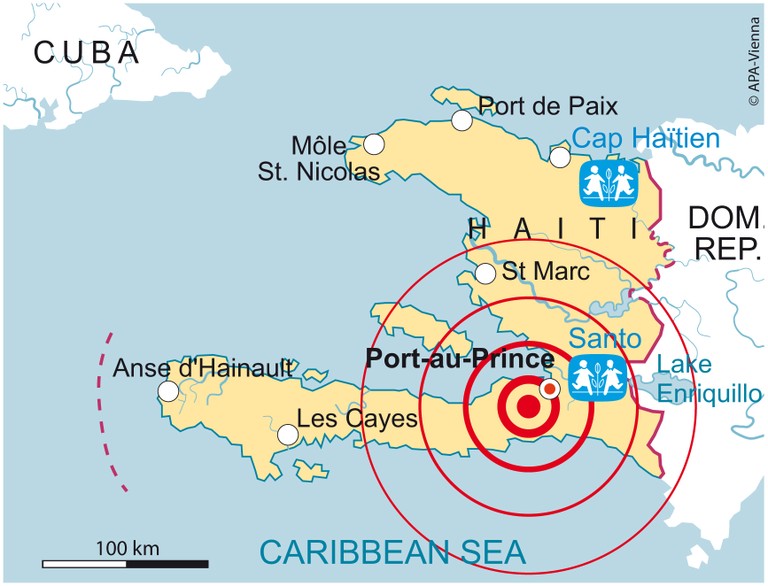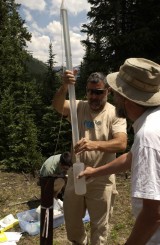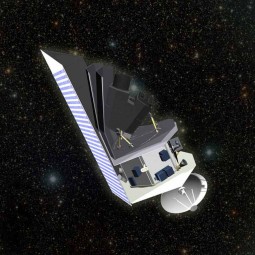
Feature #1: (start time: 06:03) On January 12, 2010, just over three years ago, a magnitude 7 earthquake shook Haiti, taking more than 200,000 lives and displacing an estimated 2 million. Still today, the International Organization for Migration estimates hundreds of thousands of people are without permanent homes, and in many ways Haiti seems no closer to rebuilding than it did three years ago. Co-host Beth Bartel speaks to Haiti’s first seismologists — Roby Douilly and Steeve Symithe, both graduate students at Purdue University — about the future of Haiti and a career in seismology there
 Feature #2: (start time: 15:42) You’ve probably heard by now that 2012 was the warmest ever in the U.S. We’re not the only ones overheating. At the bottom of the world, over the last 50 years, West Antarctica has warmed more than scientists had thought. The implications are huge; an enormous ice sheet there may be at risk of long-term collapse, which could cause sea levels to rise alarmingly. Co-host Susan Moran speaks with Andrew Monaghan, a climate scientist at the National Center for Atmospheric Research, or NCAR, here in Boulder. Dr. Monaghan co-authored the study, which was recently published in the journal Nature Geoscience.
Feature #2: (start time: 15:42) You’ve probably heard by now that 2012 was the warmest ever in the U.S. We’re not the only ones overheating. At the bottom of the world, over the last 50 years, West Antarctica has warmed more than scientists had thought. The implications are huge; an enormous ice sheet there may be at risk of long-term collapse, which could cause sea levels to rise alarmingly. Co-host Susan Moran speaks with Andrew Monaghan, a climate scientist at the National Center for Atmospheric Research, or NCAR, here in Boulder. Dr. Monaghan co-authored the study, which was recently published in the journal Nature Geoscience.
Hosts: Susan Moran and Beth Bartel
Producer: Susan Moran
Engineer: Jim Pullen
Executive Producer: Shelley Schlender
Podcast: Play in new window | Download (Duration: 24:31 — 22.5MB)
Subscribe: RSS




















 Today on How On Earth we speak with Dr. Bernie Krause about how soundscapes can help us understand the health of ecosystems. Dr. Krause has been recording the whole sounds of nature all over the world for 40 years. His new book is The Great Animal Orchestra: Finding the Origins of Music in the World’s Wild Places.
Today on How On Earth we speak with Dr. Bernie Krause about how soundscapes can help us understand the health of ecosystems. Dr. Krause has been recording the whole sounds of nature all over the world for 40 years. His new book is The Great Animal Orchestra: Finding the Origins of Music in the World’s Wild Places.
 Clean Tech Nation (start time: 4:57): Over the last few years renewable electricity generation has doubled, thanks in part to President Obama’s 2009 stimulus package. In fact, many clean technologies and industries have taken off, including solar, biofuels, green building and electric vehicles. But the stimulus money is about to run out, as is the production tax credit for wind development. To make sense of the current status of and future prospects for
Clean Tech Nation (start time: 4:57): Over the last few years renewable electricity generation has doubled, thanks in part to President Obama’s 2009 stimulus package. In fact, many clean technologies and industries have taken off, including solar, biofuels, green building and electric vehicles. But the stimulus money is about to run out, as is the production tax credit for wind development. To make sense of the current status of and future prospects for 


 Feature #2: Zero Population (start time 15:58)
Feature #2: Zero Population (start time 15:58)